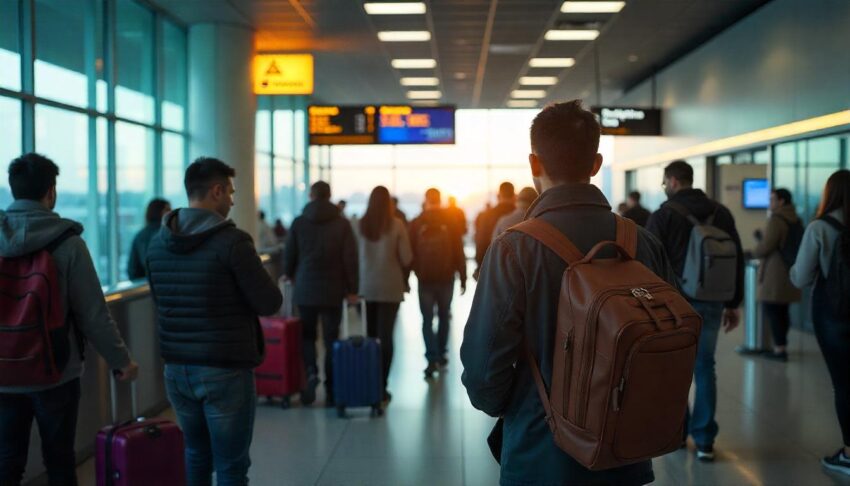US Immigration Crackdown Continues With Detentions of France, Germany, Spain Travelers at Major Airports: New Updates You Need to Know Before Planning Your Trip
Travelers from France, Germany, and Spain are now at the center of a growing U.S. immigration crackdown, with an increasing number facing unexpected detentions, intense questioning, and even deportations at major airports like JFK, LAX, and Miami — despite holding …
Travelers from France, Germany, and Spain are now at the center of a growing U.S. immigration crackdown, with an increasing number facing unexpected detentions, intense questioning, and even deportations at major airports like JFK, LAX, and Miami — despite holding valid documents. This surge in enforcement isn’t about paperwork errors but rather about intent, as U.S. border officials ramp up digital scrutiny, inspect mobile phones, and investigate whether visitors plan to work remotely or overstay. The trend has sparked government advisories, widespread traveler anxiety, and a new norm for European visitors: be ready for interrogation, or risk being sent back.
The issue isn’t about expired passports or invalid visas. It’s about intent.
According to immigration experts and recent traveler accounts, US Customs and Border Protection (CBP) officials are increasingly focused on determining whether a visitor is genuinely entering the country for tourism—or if they have other intentions such as remote work, digital nomadism, or even informal business activity. The post-pandemic surge in work-from-anywhere culture has blurred the lines between leisure travel and professional activity, and now, border agents are pushing back hard.
Reports suggest that travelers with multiple electronic devices, work-related documents, or vague itineraries are being flagged for deeper inspection. Some passengers from Germany said they were interrogated about LinkedIn profiles and freelance contracts. Others from France described being asked to hand over their phones or prove they had return tickets and sufficient funds. A few Spanish visitors, despite entering under the US Visa Waiver Program, were detained overnight and sent back to Europe without stepping outside the airport.
The United States has not officially changed its visa or entry rules for citizens of these countries, but the enforcement of existing policies has clearly tightened. US border officers are granted broad discretionary powers, which means travelers can be refused entry even with valid documents if their “intent” to visit seems questionable. This has turned the arrival process into a high-stress ordeal for many Europeans who once assumed smooth entry.
Travel industry professionals are already seeing the ripple effects. Tour operators in Spain and Germany have reported rising cancellations from clients worried about being denied entry. Travel advisors are urging visitors to the US to prepare detailed travel plans, book return flights in advance, and avoid carrying any work-related materials unless absolutely necessary.
Meanwhile, French officials have reportedly contacted US counterparts to raise concerns over the treatment of their citizens at airports. One French traveler who was detained at JFK for 12 hours said she was asked whether she had plans to meet US clients or work remotely. After denying any such plans, she was still denied entry and deported back to Paris the next morning.
For travelers, the rules remain frustratingly opaque. The US does not require European citizens from Visa Waiver Program countries to hold a tourist visa, but it does require them to declare the purpose of their trip and adhere strictly to it. Working, even remotely, is not allowed. But as the definition of “work” continues to evolve, so too does the scope of what border agents view as a violation.
At Miami International, a German couple on a month-long sightseeing trip was detained after agents reviewed their phones and found email threads related to freelance contracts. Despite explaining that they weren’t working during the trip, they were denied entry.
Travelers from Spain have echoed similar experiences. Some were asked to provide proof of hotel bookings for every night of their stay. Others were interrogated about their social media profiles or quizzed on their U.S. travel plans in extensive detail. The tone, many say, has shifted from casual screening to investigative questioning.
The increased scrutiny is not limited to a single region or entry point. Incidents have now been reported at multiple airports across the US, and while some travelers were eventually allowed to enter after intense questioning, others were not so lucky.
As the summer travel season ramps up, the situation raises major concerns. With European tourism to the US traditionally surging in warmer months, the current climate could deter many from even attempting the trip.
Here’s what you can do to avoid complications:
- Ensure you have a clear, printed itinerary with return flight details and hotel confirmations.
- Avoid carrying documents, laptops, or phones that include work-related data or contracts.
- Be prepared to explain your trip clearly and calmly, with consistent answers.
- Do not list “remote work” or “digital nomad” as a purpose for your visit unless you have the correct visa.
- Remember, CBP officers can make subjective decisions—cooperation is critical.
The message from US border control is now loud and clear: if your intent isn’t strictly tourism or family visitation, you may be in for a tough time at the gate.
The U.S. immigration crackdown isn’t just intensifying — it’s shifting into a high-tech era, where even your smartphone can get you flagged at the border. Travelers from France, Germany, and Spain are now facing increased detentions at major U.S. entry points, with many caught off guard by an unexpected layer of scrutiny: device inspections and digital intent analysis.
Customs and Border Protection (CBP) officers have stepped up enforcement at airports like JFK, LAX, and Miami, questioning European visitors for hours, reviewing social media content, and in some cases, demanding access to their mobile phones. The result? Dozens of lawful travelers have been detained, denied entry, and sent home — even when their documents were perfectly valid.
As these cases multiply, travelers across Europe are rethinking how they enter the United States. A growing number are ditching their primary smartphones and carrying burner phones instead — basic, temporary devices without social media apps, emails, or work-related data. Why? Because agents have been checking for everything from LinkedIn profiles to freelance contracts and political posts, especially if they suspect a visitor is planning to work remotely or overstay.
In fact, recent reports confirm that France, Germany, Denmark, and Ireland have already issued quiet advisories, urging their citizens to sanitize devices or travel with minimal digital footprints. Countries like Spain, Italy, Sweden, Belgium, Portugal, Poland, and Bulgaria are following suit, echoing the concern that innocent digital content — or even a wiped phone — can trigger suspicion.
One French national recently told local media that she was denied entry at JFK after officers discovered political discussions in her WhatsApp messages. In another case, a German tourist flying into Miami with her partner was reportedly held overnight because officers found emails about remote work on their laptops — even though they were on holiday.
Immigration attorneys in both Europe and North America confirm the trend. “It’s no longer just about having the right passport or visa,” said a Canadian legal expert. “It’s about what’s on your phone, what’s in your cloud, and how much you say — or don’t say — about your plans.”
Some experts argue that burner phones offer travelers a layer of protection, but they also warn that bringing a freshly wiped device or an unusually empty phone can itself be a red flag. CBP officers have full authority to inspect, detain, and even seize devices at the border — without a warrant — under the U.S. border search exemption policy. And that’s exactly what’s happening to an increasing number of Europeans.
Canadian travelers are also feeling the heat. A number of digital nomads and remote workers have reported being turned around or held for secondary screening when flying into U.S. airports — even with valid visas and return tickets in hand.
In response to the growing outcry, some European officials have quietly raised concerns with Washington, but so far, no formal changes have been made to CBP’s enforcement policies. Until then, travelers from France, Germany, and Spain — once considered “low-risk” — are now finding themselves caught in an unpredictable system, where intent is everything and digital transparency is the new currency.
As summer travel ramps up and border agents sharpen their focus, European visitors must tread carefully. Whether it’s what you say at passport control or what’s saved on your phone, every detail now matters.
If you’re planning a U.S. trip from any of these countries, be prepared. This crackdown shows no signs of slowing — and your smartphone might just be the next thing under review.
Travelers from France, Germany, and Spain are being detained at major U.S. airports like JFK, LAX, and Miami as immigration officials intensify crackdowns targeting suspected work intent and digital content, even when visitors hold valid documents. The focus has shifted from visas to device inspections and intent verification, leaving many caught off guard.
As policies continue to evolve and enforcement becomes stricter, travelers from France, Germany, and Spain—three of the largest sources of inbound European tourism—may need to rethink how they prepare for travel to the US. The longstanding perception of easy entry is rapidly disappearing, replaced by a new era of uncertainty and suspicion at the border.
So if you’re planning to fly into America anytime soon, especially from Western Europe, think twice before packing your laptop or answering that one last client email. What you say—and carry—might determine whether you spend your vacation exploring the US… or flying right back home.
The post US Immigration Crackdown Continues With Detentions of France, Germany, Spain Travelers at Major Airports: New Updates You Need to Know Before Planning Your Trip appeared first on Travel and Tour World


